Schmitt C.B. (ed.) The Cambridge History of Renaissance Philosophy
Подождите немного. Документ загружается.

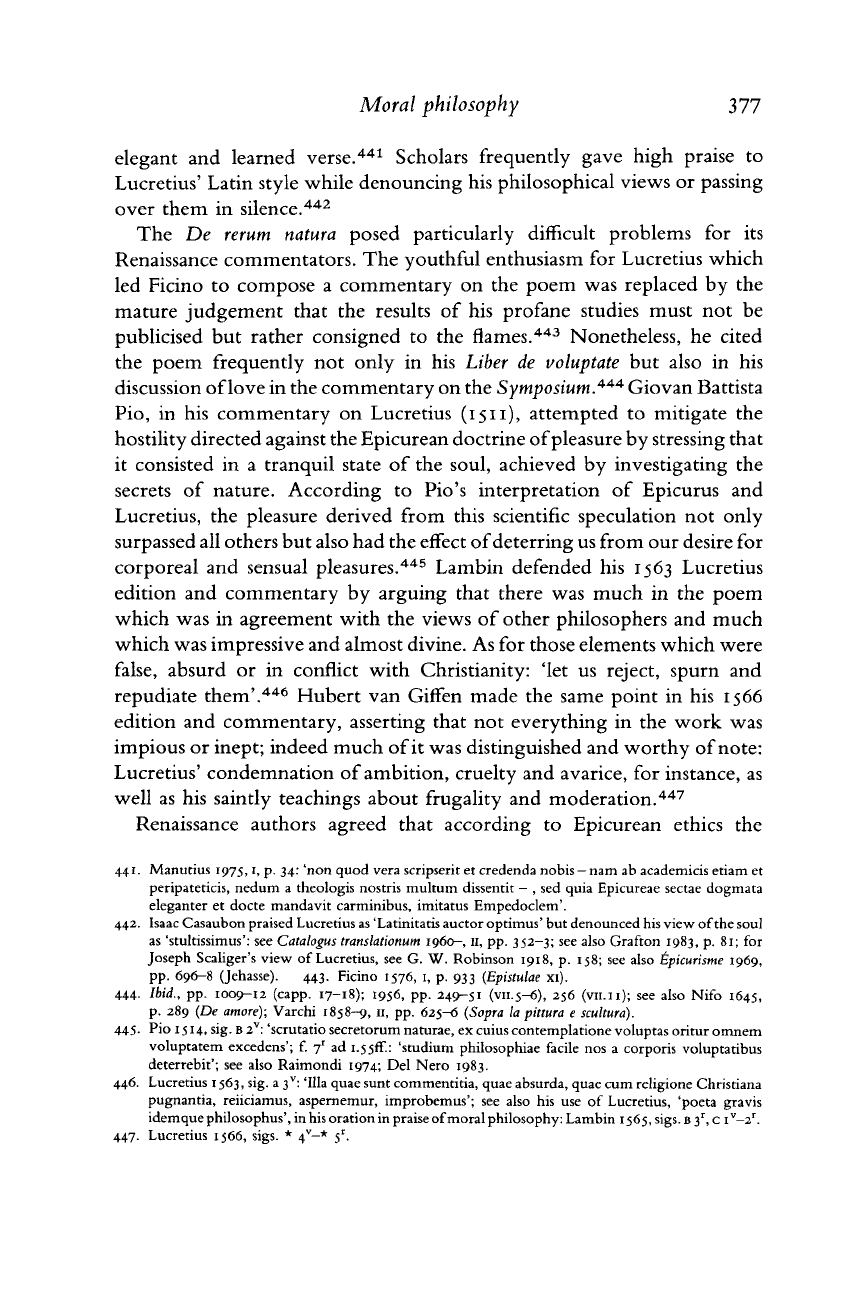
Moral philosophy
377
elegant
and
learned verse.
441
Scholars frequently gave high praise
to
Lucretius'
Latin style while denouncing
his
philosophical
views
or
passing
over
them
in
silence.
442
The
De
rerum
natura posed particularly difficult problems
for its
Renaissance commentators.
The
youthful enthusiasm
for
Lucretius which
led
Ficino
to
compose
a
commentary
on the
poem
was
replaced
by the
mature judgement
that
the
results
of his
profane studies must
not be
publicised
but
rather
consigned
to the
flames.
443
Nonetheless,
he
cited
the poem frequently
not
only
in his
Liber
de
voluptate
but
also
in his
discussion
of
love
in the
commentary
on the
Symposium.
444
Giovan Battista
Pio,
in his
commentary
on
Lucretius
(1511),
attempted
to
mitigate
the
hostility directed against
the
Epicurean doctrine
of
pleasure
by
stressing
that
it consisted
in a
tranquil state
of the
soul, achieved
by
investigating
the
secrets
of
nature. According
to
Pio's interpretation
of
Epicurus
and
Lucretius,
the
pleasure derived from this scientific speculation
not
only
surpassed all others
but
also
had the
effect
of
deterring
us
from
our
desire
for
corporeal
and
sensual pleasures.
445
Lambin defended
his 1563
Lucretius
edition
and
commentary
by
arguing
that
there
was
much
in the
poem
which
was in
agreement with
the
views
of
other philosophers
and
much
which
was impressive
and
almost divine. As
for
those elements which were
false,
absurd
or in
conflict with Christianity:
'let us
reject, spurn
and
repudiate them'.
446
Hubert
van
Giffen
made
the
same point
in his 1566
edition
and
commentary, asserting
that
not
everything
in the
work
was
impious
or
inept; indeed much
of
it was distinguished
and
worthy
of
note:
Lucretius'
condemnation
of
ambition, cruelty
and
avarice,
for
instance,
as
well
as his
saintly teachings about frugality
and
moderation.
447
Renaissance authors agreed
that
according
to
Epicurean ethics
the
441.
Manutius
1975,1,
p. 34: 'non quod vera scripserit et credenda nobis - nam ab academicis etiam et
peripateticis, nedum a theologis nostris multum dissentit - , sed quia Epicureae sectae dogmata
eleganter et docte mandavit carminibus, imitatus Empedoclem'.
442. Isaac Casaubon praised Lucretius as 'Latinitatis auctor optimus' but denounced his view of the soul
as 'stultissimus': see
Catalogus
translationum
i960-,
11,
pp. 352-3; see also Grafton 1983, p. 81; for
Joseph Scaliger's view of Lucretius, see G. W. Robinson 1918, p. 158; see also
fcpicurisme
1969,
pp.
696-8
(Jehasse). 443. Ficino 1576, 1, p. 933
(Epistulae
xi).
444.
Ibid.,
pp. 1009-12 (capp.
17-18);
1956, pp. 249-51 (vn.5-^6), 256
(VII.
11);
see also Nifo 1645,
p.
289 (De
amore);
Varchi
1858-9, 11, pp. 625-6
(Sopra
la
pittura
e
scultura).
445. Pio 1514, sig. B 2
V
: 'scrutatio secretorum naturae, ex cuius contemplatione voluptas oritur omnem
voluptatem excedens'; f. f ad
i.ssff.:
'studium philosophiae facile nos a corporis voluptatibus
deterrebit'; see also Raimondi 1974; Del Nero 1983.
446. Lucretius 1563, sig. a 3
V
: 'Ilia quae sunt commentitia, quae absurda, quae cum religione Christiana
pugnantia,
reiiciamus, aspernemur, improbemus'; see also his use of Lucretius, 'poeta gravis
idemque philosophus', in his oration in praise of moral philosophy: Lambin i565,sigs.B 3
r
, c i
v
-2
r
.
447. Lucretius 1566, sigs. * 4
V
-* 5
r
.
Cambridge Histories Online © Cambridge University Press, 2008
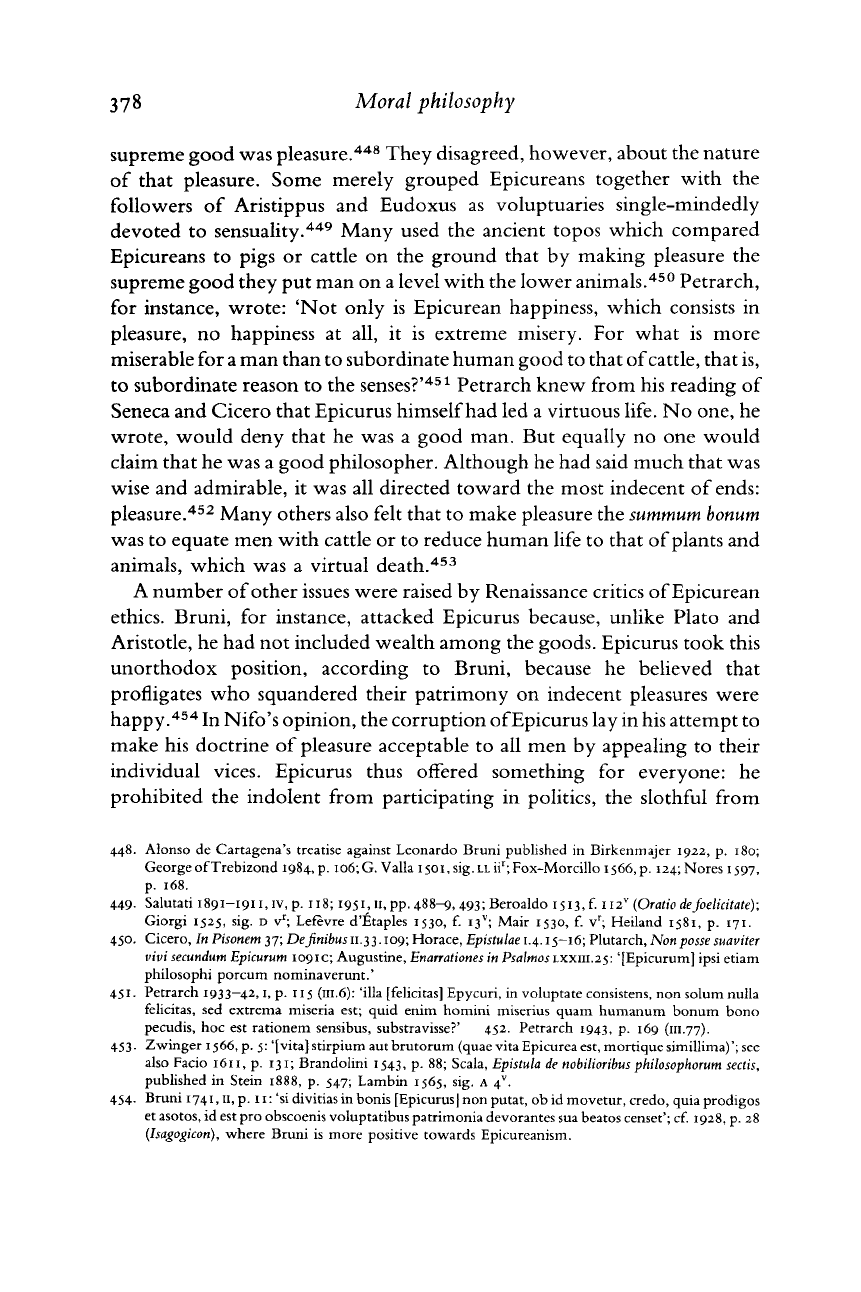
378
Moral philosophy
supreme good was pleasure.
448
They disagreed, however, about the
nature
of
that
pleasure. Some merely grouped Epicureans together with the
followers
of Aristippus and Eudoxus as voluptuaries single-mindedly
devoted
to sensuality.
449
Many used the ancient topos which compared
Epicureans to pigs or cattle on the ground
that
by making pleasure the
supreme good they put man on a
level
with the lower animals.
450
Petrarch,
for
instance, wrote: 'Not only is Epicurean happiness, which consists in
pleasure, no happiness at all, it is extreme misery. For what is more
miserable for a man than to subordinate human good to
that
of
cattle,
that
is,
to subordinate reason to the senses?'
451
Petrarch knew from his reading of
Seneca
and
Cicero
that
Epicurus
himself
had led a virtuous
life.
No one, he
wrote,
would deny
that
he was a good man. But equally no one would
claim
that
he was a good philosopher. Although he had said much
that
was
wise
and admirable, it was all directed toward the most indecent of ends:
pleasure.
452
Many others also felt
that
to make pleasure the
summum
bonum
was
to equate men with cattle or to reduce human
life
to
that
of
plants and
animals, which was a virtual death.
453
A
number
of
other issues were raised by Renaissance critics
of
Epicurean
ethics.
Bruni, for instance, attacked Epicurus because, unlike Plato and
Aristotle,
he had not included wealth among the goods. Epicurus took this
unorthodox position, according to Bruni, because he believed
that
profligates
who squandered their patrimony on indecent pleasures were
happy.
454
In
Nifo's
opinion, the corruption
of
Epicurus lay in his attempt to
make his doctrine of pleasure acceptable to all men by appealing to their
individual
vices.
Epicurus thus offered something for everyone: he
prohibited the indolent from participating in politics, the slothful from
448.
Alonso
de
Cartagena's
treatise
against
Leonardo
Bruni
published
in
Birkenmajer
1922, p. 180;
George
of
Trebizond
1984, p. 106; G. Valla 1501, sig.
LL
ii
r
;
Fox-Morcillo
1566, p.
i24;Nores
1597,
p. 168.
449.
Salutati
1891-1911, iv, p. 118;
1951,11,
pp.
488-9,
493;
Beroaldo
1513, f.
ii2
v
(Oratio defoelicitate);
Giorgi 1525, sig. D v
r
;
Lefevre
d'Etaples
1530, f. i3
v
; Mair 1530, f. v
r
;
Heiland
1581, p. 171.
450. Cicero, In Pisonem 37; DeJinibus 11.33.109;
Horace,
Epistulae 1.4.15-16;
Plutarch,
Nonposse suaviter
vivi secundum Epicurum 1091c;
Augustine,
Enarrationes in Psalmos
Lxxm.25:
'[Epicurum]
ipsi
etiam
philosophi
porcum
nominaverunt.'
451.
Petrarch
1933-42,1, p. 115 (111.6):
'ilia
[felicitas]
Epycuri, in
voluptate
consistens,
non
solum
nulla
felicitas,
sed
extrema
miseria
est;
quid
enim
homini
miserius
quam
humanum
bonum
bono
pecudis,
hoc est
rationem
sensibus,
substravisse?'
452.
Petrarch
1943, p. 169 (111.77).
453.
Zwinger
1566, p. 5:
'[vita]
stirpium
aut
brutorum
(quae
vitaEpicurea
est,
mortique
simillima)';
see
also
Facio
1611, p. 131;
Brandolini
1543, p. 88;
Scala,
Epistula de nobilioribus philosophorum seeds,
published
in
Stein
1888, p. 547; Lambin 1565, sig. A 4
V
.
454.
Bruni
1741,11,
p. 11: 'si
divitias
in
bonis
[Epicurus]
non
putat,
ob id
movetur,
credo, quia
prodigos
et
asotos,
id est pro
obscoenis
voluptatibus
patrimonia
devorantes
sua
beatos
censet';
cf. 1928, p. 28
(Isagogicon),
where
Bruni
is
more
positive
towards
Epicureanism.
Cambridge Histories Online © Cambridge University Press, 2008
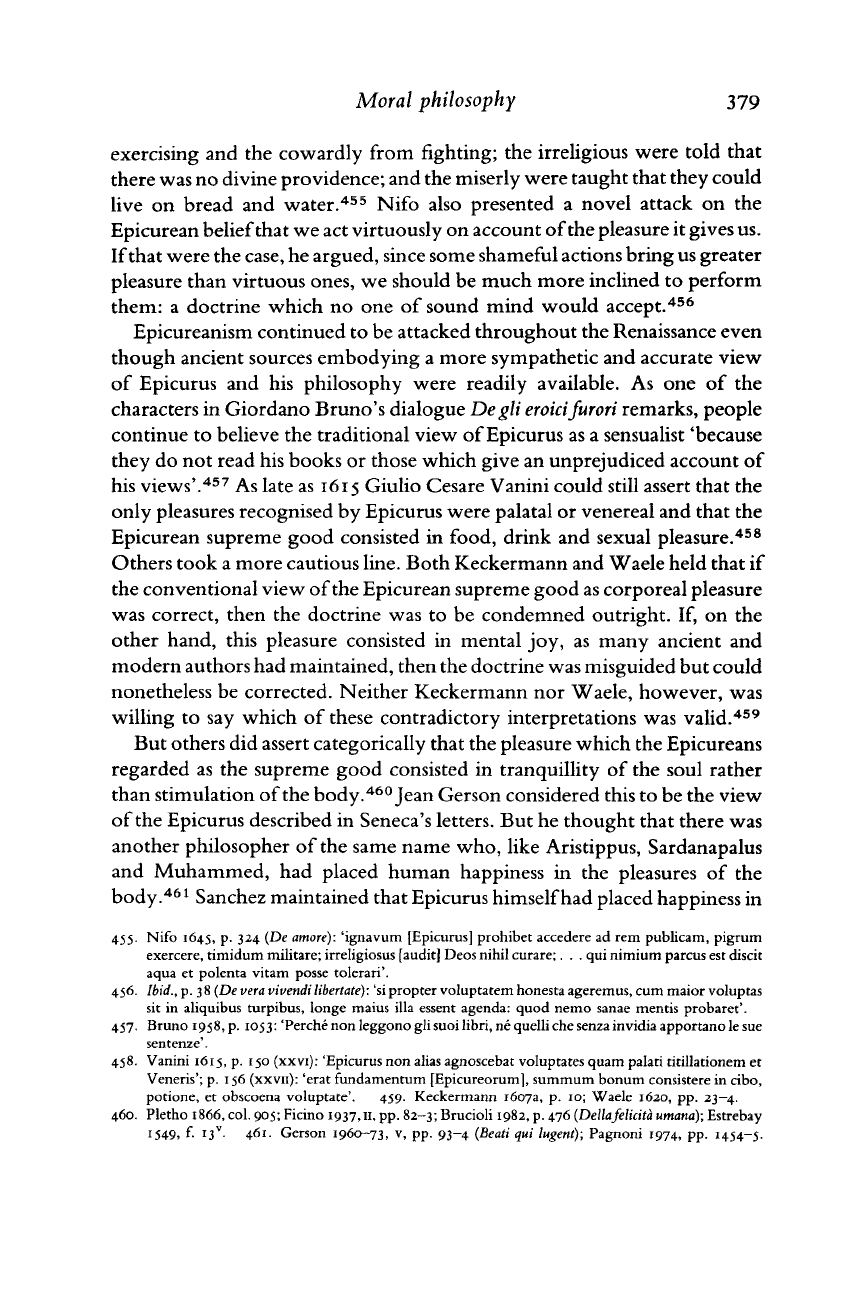
Moral
philosophy
379
exercising and the cowardly from fighting; the irreligious were told that
there was no divine providence; and the miserly were taught that they could
live on bread and water.
455
Nifo also presented a novel attack on the
Epicurean
belief
that
we act virtuously on account of the pleasure it gives us.
If
that
were the case, he argued,
since
some
shameful actions bring us greater
pleasure than virtuous ones, we should be much more inclined to perform
them: a doctrine which no one of sound mind would accept.
456
Epicureanism
continued to be attacked throughout the Renaissance even
though ancient sources embodying a more sympathetic and accurate view
of Epicurus and his philosophy were readily available. As one of the
characters
in Giordano Bruno's dialogue
Degli
eroicifurori
remarks, people
continue to believe the traditional view of
Epicurus
as a sensualist 'because
they do not read his books or
those
which give an unprejudiced account of
his views'.
457
As late as
1615
Giulio Cesare Vanini could still assert that the
only pleasures recognised by Epicurus were palatal or venereal and that the
Epicurean
supreme good consisted in food, drink and sexual pleasure.
458
Others
took a more cautious line. Both
Keckermann
and Waele held that if
the conventional view of the Epicurean supreme good as corporeal pleasure
was correct, then the doctrine was to be condemned outright. If, on the
other hand, this pleasure consisted in mental joy, as many ancient and
modern authors had maintained, then the doctrine was misguided but could
nonetheless
be corrected. Neither Keckermann nor Waele, however, was
willing to say which of
these
contradictory interpretations was valid.
459
But
others did assert categorically that the pleasure which the Epicureans
regarded
as the supreme good consisted in tranquillity of the soul rather
than stimulation of the body.
460
Jean
Gerson considered this to be the view
of the Epicurus described in Seneca's letters. But he thought that there was
another philosopher of the same name who, like Aristippus, Sardanapalus
and Muhammed, had placed human happiness in the pleasures of the
body.
461
Sanchez maintained that Epicurus himself
had
placed happiness in
455.
Nifo 1645, p. 324 (De
amore):
'ignavum [Epicurus] prohibet accedere ad rem publicam, pigrum
exercere, timidum militare; irreligiosus [audit] Deos nihil curare;. . . qui nimium parcus est discit
aqua
et polenta vitam
posse
tolerari'.
456.
Ibid.,
p. 38 (De
vera
vivendi
libertate):
'si propter voluptatem honesta ageremus, cum maior voluptas
sit in aliquibus turpibus, longe maius ilia
essent
agenda: quod nemo sanae mentis probaret'.
457.
Bruno 1958, p. 1053: 'Perche non leggono gli suoi libri, ne quelli che senza invidia apportano le sue
sentenze'.
458. Vanini 1615, p. 150 (xxvi): 'Epicurus non alias agnoscebat voluptates quam palati titillationem et
Veneris';
p. 156 (xxvn): 'erat fundamentum [Epicureorum], summum bonum consistere in cibo,
potione, et obscoena voluptate'. 459. Keckermann 1607a, p. 10; Waele 1620, pp. 23—4.
460. Pletho 1866, col. 905; Ficino
1937,11,
pp. 82-3; Brucioli 1982, p. 476
(Deliafelicita
umana);
Estrebay
1549,
f. I3
V
. 461. Gerson 1960-73, v, pp. 93-4
(Bead
qui
lugent);
Pagnoni 1974, pp.
1454-5.
Cambridge Histories Online © Cambridge University Press, 2008
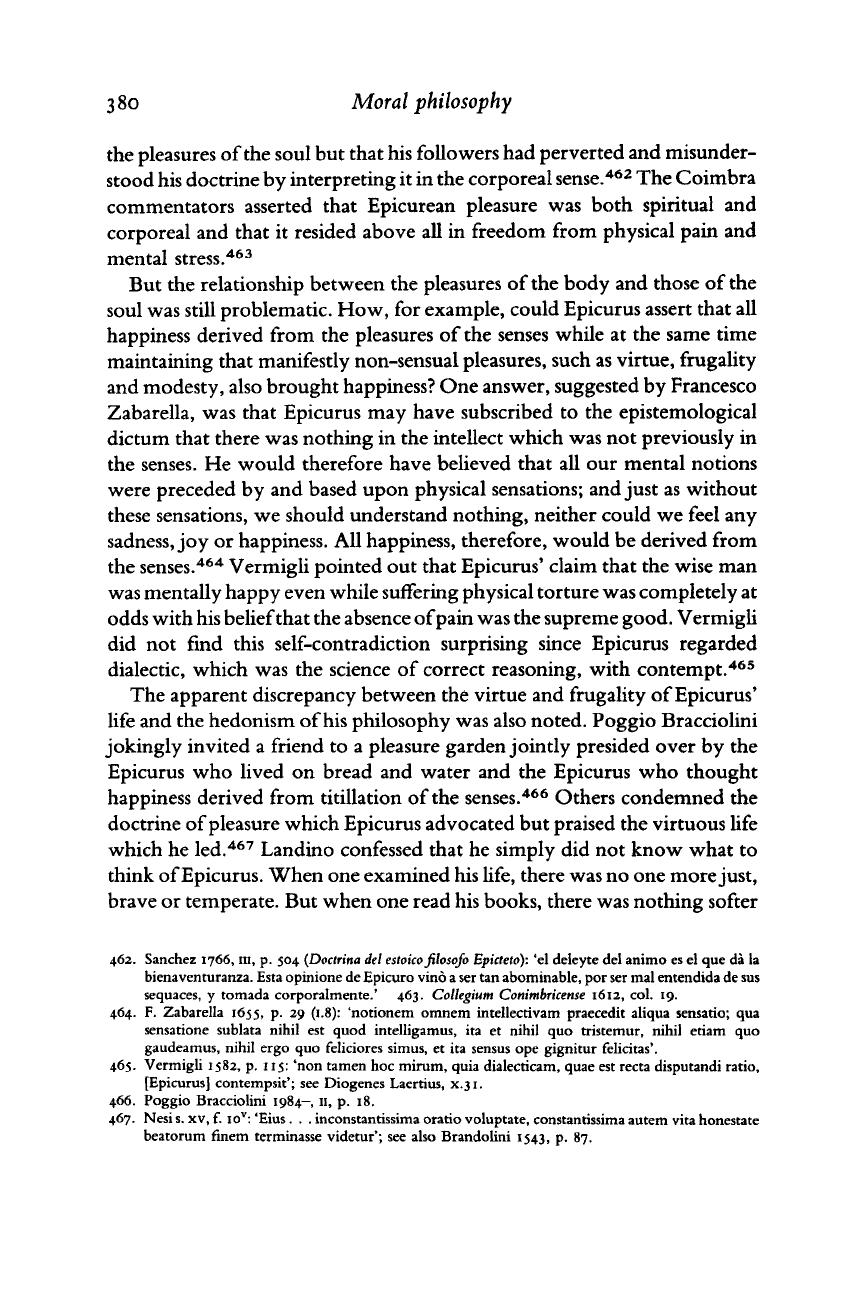
38o
Moral philosophy
the pleasures of the soul but that his followers had perverted and misunder-
stood his doctrine by interpreting it in the corporeal
sense.
462
The
Coimbra
commentators asserted that Epicurean pleasure was both spiritual and
corporeal
and that it resided above all in freedom from physical pain and
mental stress.
463
But
the relationship between the pleasures of the body and
those
of the
soul was still problematic. How, for example, could Epicurus assert that all
happiness derived from the pleasures of the
senses
while at the same time
maintaining that manifestly non-sensual pleasures, such as virtue, frugality
and modesty, also brought happiness? One answer, suggested by Francesco
Zabarella,
was that Epicurus may have subscribed to the epistemological
dictum
that there was nothing in the intellect which was not previously in
the
senses.
He would therefore have believed that all our mental notions
were preceded by and based upon physical sensations; and just as without
these
sensations, we should understand nothing, neither could we feel any
sadness, joy or happiness. All happiness, therefore, would be derived from
the
senses.
464
Vermigli pointed out that
Epicurus'
claim that the wise man
was mentally happy even while suffering physical torture was completely at
odds with his belief
that
the absence of pain was the supreme good. Vermigli
did not find this self-contradiction surprising
since
Epicurus regarded
dialectic, which was the science of correct reasoning, with contempt.
465
The
apparent discrepancy between the virtue and frugality of
Epicurus'
life and the hedonism of his philosophy was also noted. Poggio Bracciolini
jokingly
invited a friend to a pleasure
garden
jointly presided over by the
Epicurus
who lived on bread and water and the Epicurus who thought
happiness derived from titillation of the
senses.
466
Others condemned the
doctrine of pleasure which Epicurus advocated but praised the virtuous life
which he led.
467
Landino confessed that he simply did not know what to
think
of
Epicurus.
When one examined his life, there was no one more
just,
brave
or temperate. But when one read his books, there was nothing softer
462. Sanchez 1766, in, p. 504
(Doctrina
del
estoico
filosofo
Epicteto):
'el deleyte del animo es el que da la
bienaventuranza.
Esta opinione de Epicuro vino a ser tan abominable, por ser mal entendida de sus
sequaces, y tomada corporalmente.' 463. Collegium Conimbricense 1612, col. 19.
464. F.
Zabarella
1655, p. 29 (1.8): 'notionem omnem intellectivam praecedit aliqua sensatio; qua
sensatione sublata nihil est quod intelligamus, ita et nihil quo tristemur, nihil etiam quo
gaudeamus,
nihil ergo quo feliciores simus, et ita
sensus
ope gignitur felicitas'.
465. Vermigli 1582, p. 115: 'non tamen hoc mirum, quia dialecticam, quae est recta disputandi ratio,
[Epicurus]
contempsit'; see Diogenes Laertius, x.31.
466. Poggio Bracciolini 1984-, 11, p. 18.
467. Nesi s. xv, f. io
v
: 'Eius . . . inconstantissima oratio voluptate, constantissima autem vita honestate
beatorum
finem terminasse videtur'; see also Brandolini 1543, p. 87.
Cambridge Histories Online © Cambridge University Press, 2008
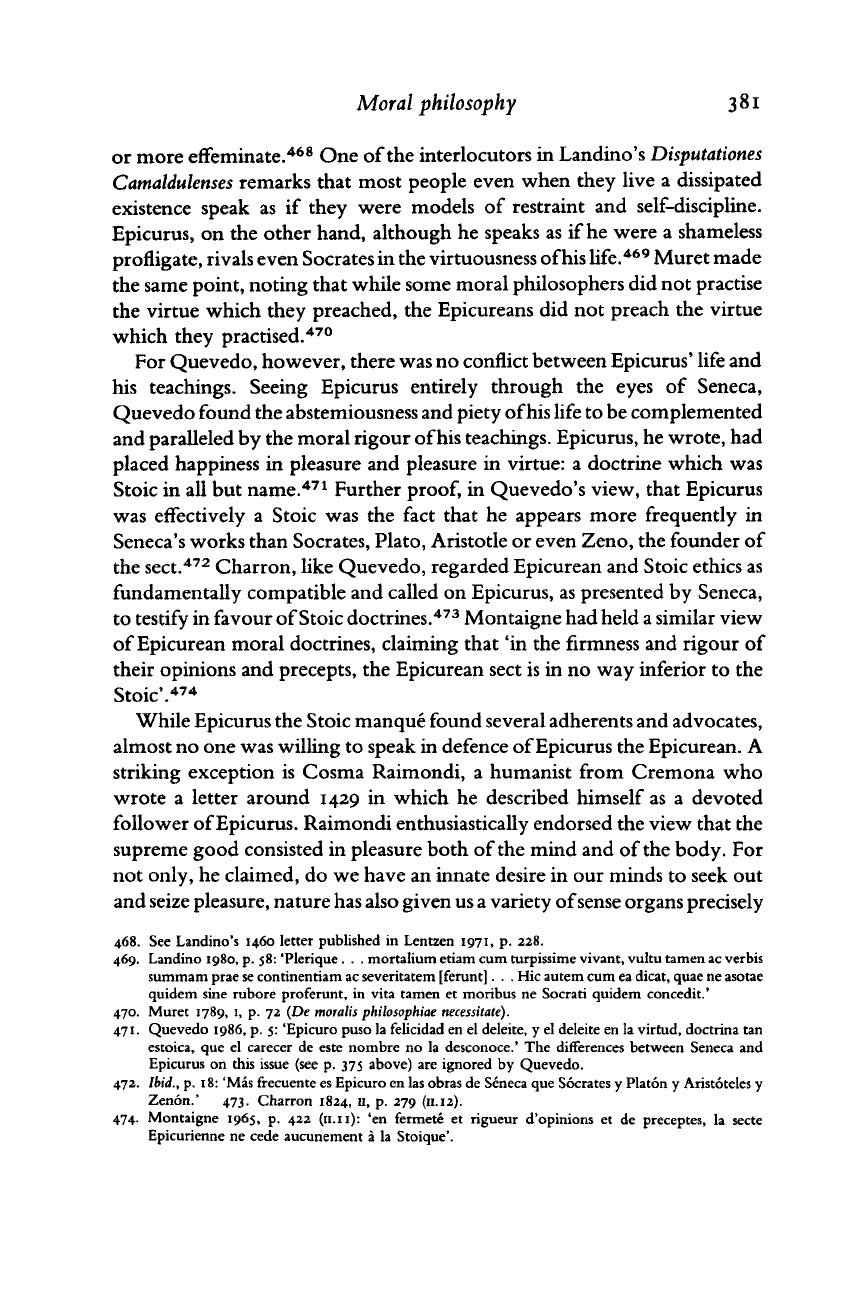
Moral
philosophy
38i
or more effeminate.
468
One of the interlocutors in Landino's
Disputationes
Camaldulenses
remarks that most people even when they live a dissipated
existence speak as if they were models of restraint and self-discipline.
Epicurus,
on the other hand, although he speaks as if he were a shameless
profligate,
rivals even Socrates in the virtuousness of his life.
469
Muret made
the same point, noting that while
some
moral philosophers did not practise
the virtue which they preached, the Epicureans did not preach the virtue
which they practised.
470
For
Quevedo, however, there was no conflict between
Epicurus'
life and
his teachings. Seeing Epicurus entirely through the eyes of Seneca,
Quevedo
found the abstemiousness and piety of his life to be complemented
and paralleled by the moral rigour of his teachings. Epicurus, he wrote, had
placed happiness in pleasure and pleasure in virtue: a doctrine which was
Stoic in all but name.
471
Further proof, in Quevedo's view, that Epicurus
was effectively a Stoic was the fact that he appears more frequently in
Seneca's works than Socrates, Plato, Aristotle or even Zeno, the founder of
the sect.
472
Charron,
like Quevedo, regarded Epicurean and Stoic ethics as
fundamentally compatible and called on Epicurus, as presented by Seneca,
to testify in favour of Stoic doctrines.
473
Montaigne had held
a
similar view
of
Epicurean
moral doctrines, claiming that 'in the firmness and rigour of
their opinions and precepts, the Epicurean sect is in no way inferior to the
Stoic'.
474
While
Epicurus
the Stoic manque found several adherents and advocates,
almost no one was willing to speak in defence of
Epicurus
the Epicurean. A
striking exception is Cosma Raimondi, a humanist from Cremona who
wrote a letter around 1429 in which he described himself as a devoted
follower of
Epicurus.
Raimondi enthusiastically endorsed the view that the
supreme good consisted in pleasure both of the mind and of the body. For
not only, he claimed, do we have an innate desire in our minds to seek out
and
seize
pleasure, nature has also given us a variety of
sense
organs precisely
468. See Landino's 1460 letter published in Lentzen 1971, p. 228.
469. Landino 1980, p. 58: 'Plerique. . . mortalium etiam cum turpissime vivant, vultu tamen ac verbis
summam prae se continentiam ac severitatem [ferunt]. . . Hie autem cum ea dicat, quae ne asotae
quidem
sine
rubore proferunt, in vita tamen et moribus ne Socrati quidem concedit.'
470. Muret 1789, 1, p. 72 (De
moralis
philosophiae
necessitate).
471.
Quevedo 1986, p. 5: 'Epicuro puso la felicidad en el deleite, y el deleite en la virtud, doctrina tan
estoica, que el carecer de
este
nombre no la desconoce.' The differences between Seneca and
Epicurus
on this
issue
(see p. 375 above) are ignored by Quevedo.
472.
Ibid.,
p. 18: 'Mas frecuente es Epicuro en las obras de Seneca que Socrates y Platon y Aristoteles y
Zenon.'
473. Charron 1824, n, p. 279
(11.12).
474.
Montaigne 1965. p. 422
(11.11):
'en fermete et rigueur d'opinions et de preceptes, la secte
Epicurienne ne cede aucunement a la Stoique'.
Cambridge Histories Online © Cambridge University Press, 2008
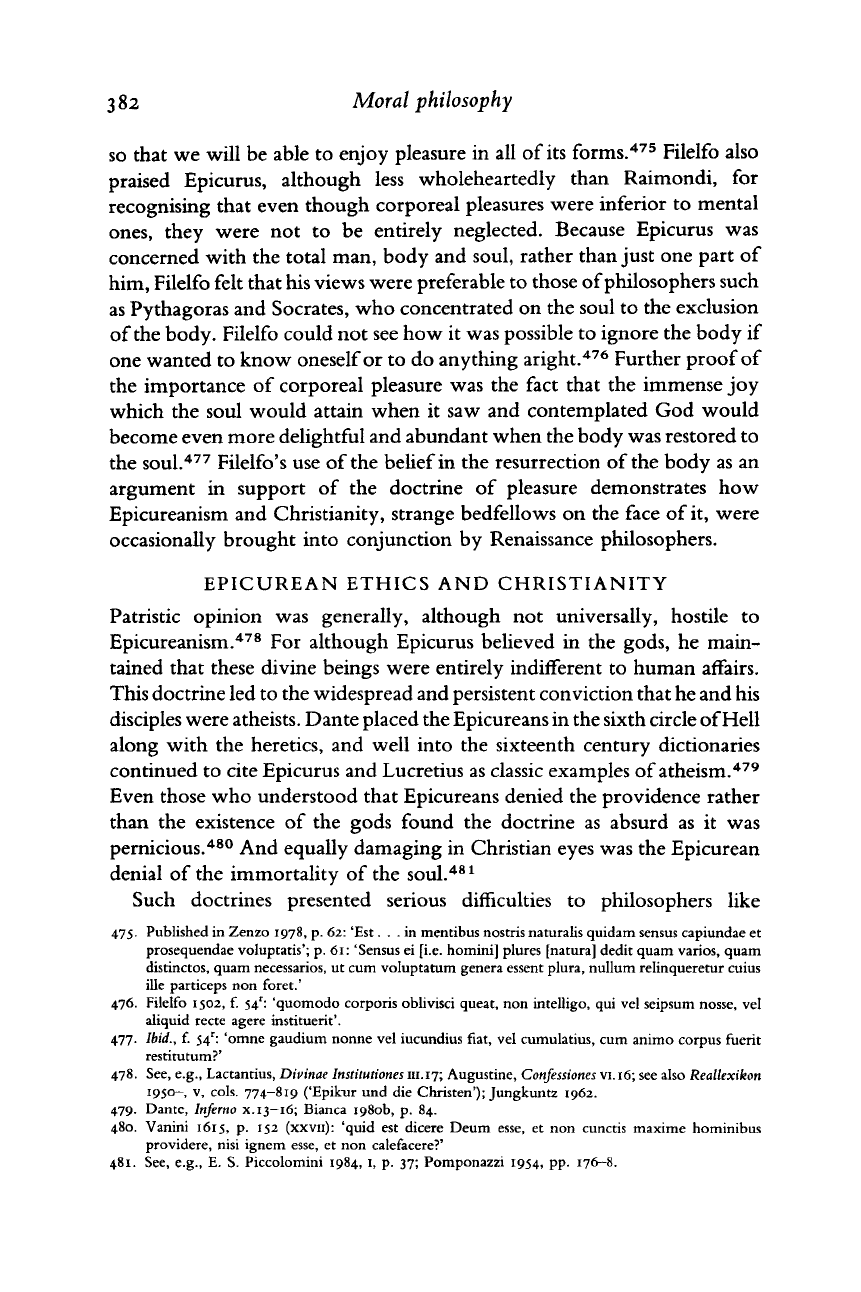
382
Moral
philosophy
so that we will be able to enjoy pleasure in all of its forms.
475
Filelfo also
praised Epicurus, although
less
wholeheartedly than Raimondi, for
recognising that even though corporeal pleasures were inferior to mental
ones, they were not to be entirely neglected. Because Epicurus was
concerned with the total man, body and soul, rather than just one part of
him,
Filelfo felt that his views were preferable to
those
of philosophers such
as Pythagoras and Socrates, who concentrated on the soul to the exclusion
of the body. Filelfo could not see how it was possible to ignore the body if
one wanted to know
oneself
or to do anything aright.
476
Further proof of
the importance of corporeal pleasure was the fact that the immense joy
which the soul would attain when it saw and contemplated God would
become even more delightful and abundant when the body was restored to
the soul.
477
Filelfo's use of the belief in the resurrection of the body as an
argument
in support of the doctrine of pleasure demonstrates how
Epicureanism
and Christianity, strange bedfellows on the face of it, were
occasionally brought into conjunction by Renaissance philosophers.
EPICUREAN
ETHICS
AND
CHRISTIANITY
Patristic
opinion was generally, although not universally, hostile to
Epicureanism.
478
For although Epicurus believed in the gods, he main-
tained that
these
divine beings were entirely indifferent to human affairs.
This
doctrine led to the widespread and persistent conviction that he and his
disciples were atheists. Dante placed the
Epicureans
in the sixth circle of
Hell
along with the heretics, and well into the sixteenth century dictionaries
continued to cite Epicurus and Lucretius as classic examples of atheism.
479
Even
those
who understood that Epicureans denied the providence rather
than the existence of the gods found the doctrine as absurd as it was
pernicious.
480
And equally damaging in Christian eyes was the Epicurean
denial of the immortality of the soul.
481
Such
doctrines presented
serious
difficulties to philosophers like
475.
Published in Zenzo 1978, p. 62:
'Est...
in mentibus nostris naturalis quidam
sensus
capiundae et
prosequendae voluptatis'; p. 61: 'Sensus ei [i.e. homini] plures [natura] dedit quam varios, quam
distinctos, quam necessarios, ut cum voluptatum genera
essent
plura, nullum relinqueretur cuius
ille
particeps non foret.'
476.
Filelfo 1502, f. 54
r
: 'quomodo corporis oblivisci queat, non intelligo, qui vel seipsum
nosse,
vel
aliquid
recte agere instituerit'.
477.
Ibid.,
£. 54
r
: 'omne gaudium nonne vel iucundius fiat, vel cumulatius, cum animo corpus fuerit
restitutum?'
478.
See, e.g., Lactantius,
Divinae
Institutiones
m.17; Augustine,
Confessiones
vi.16;
see also
Reallexikon
I95°~.
v, cols. 774-819 ('Epikur und die Christen'); Jungkuntz 1962.
479.
Dante,
Inferno
x.
13-16;
Bianca 1980b, p. 84.
480. Vanini 1615, p. 152 (xxvn): 'quid est dicere Deum
esse,
et non cunctis maxime hominibus
providere,
nisi
ignem
esse,
et non calefacere?'
481.
See, e.g., E. S. Piccolomini 1984, 1, p. 37; Pomponazzi 1954, pp.
176-8.
Cambridge Histories Online © Cambridge University Press, 2008
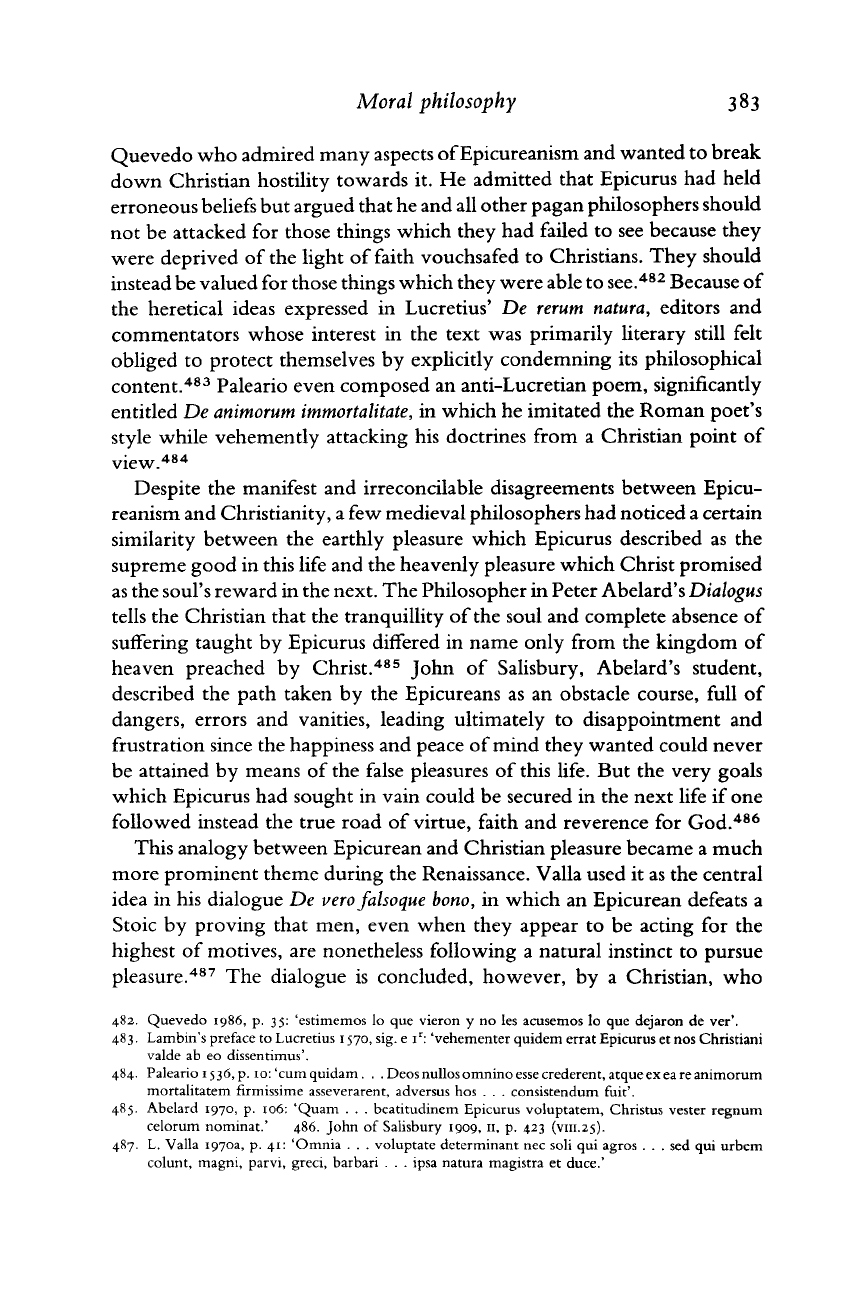
Moral
philosophy
383
Quevedo
who admired many aspects of
Epicureanism
and wanted to break
down Christian hostility towards it. He admitted that Epicurus had held
erroneous beliefs but argued that he and all other pagan philosophers should
not be attacked for
those
things which they had failed to see because they
were deprived of the light of faith vouchsafed to Christians.
They
should
instead be valued for
those
things which they were able to
see.
482
Because of
the heretical ideas expressed in Lucretius' De
rerum
natura,
editors and
commentators whose interest in the text was primarily literary still felt
obliged to protect themselves by explicitly condemning its philosophical
content.
483
Paleario even composed an anti-Lucretian poem, significantly
entitled De
animorum
immortalitate,
in which he imitated the Roman poet's
style while vehemently attacking his doctrines from a Christian point of
view.
484
Despite the manifest and irreconcilable disagreements between
Epicu-
reanism and
Christianity,
a few medieval philosophers had noticed a certain
similarity between the earthly pleasure which Epicurus described as the
supreme good in this life and the heavenly pleasure which
Christ
promised
as the
soul's
reward in the next. The Philosopher in Peter
Abelard's
Dialogus
tells
the Christian that the tranquillity of the soul and complete absence of
suffering taught by Epicurus differed in name only from the kingdom of
heaven preached by
Christ.
485
John of Salisbury, Abelard's student,
described the path taken by the Epicureans as an obstacle course, full of
dangers,
errors and vanities, leading ultimately to disappointment and
frustration
since
the happiness and peace of mind they wanted could never
be attained by means of the false pleasures of this life. But the very goals
which Epicurus had sought in vain could be secured in the next life if one
followed instead the true road of virtue, faith and reverence for
God.
486
This
analogy between Epicurean and Christian pleasure became a much
more prominent theme during the Renaissance.
Valla
used it as the central
idea in his dialogue De
vero
falsoque
bono,
in which an Epicurean defeats a
Stoic by proving that men, even when they appear to be acting for the
highest of motives, are
nonetheless
following a natural instinct to pursue
pleasure.
487
The dialogue is concluded, however, by a Christian, who
482. Quevedo 1986, p. 35:
'estimemos
lo que vieron y no les
acusemos
lo que dejaron de ver\
483. Lambin's preface to Lucretius 1570, sig. e i
r
: 'vehementer quidem errat Epicurus et nos Christiani
valde ab eo
dissentimus'.
484. Paleario 1536, p. 10: 'cumquidam. . .
Deos
nullos
omnino
esse
crederent, atque ex ea re animorum
mortalitatem
firmissime
asseverarent, adversus hos . . . consistendum fuit'.
485. Abelard 1970, p. 106: 'Quam . . . beatitudinem Epicurus voluptatem, Christus vester regnum
celorum nominat.' 486. John of Salisbury 1909, 11, p. 423 (vin.25).
487. L. Valla 1970a, p. 41: 'Omnia . . . voluptate determinant nec
soli
qui agros . . . sed qui urbem
colunt, magni, parvi, greci, barbari . . . ipsa natura magistra et duce.'
Cambridge Histories Online © Cambridge University Press, 2008
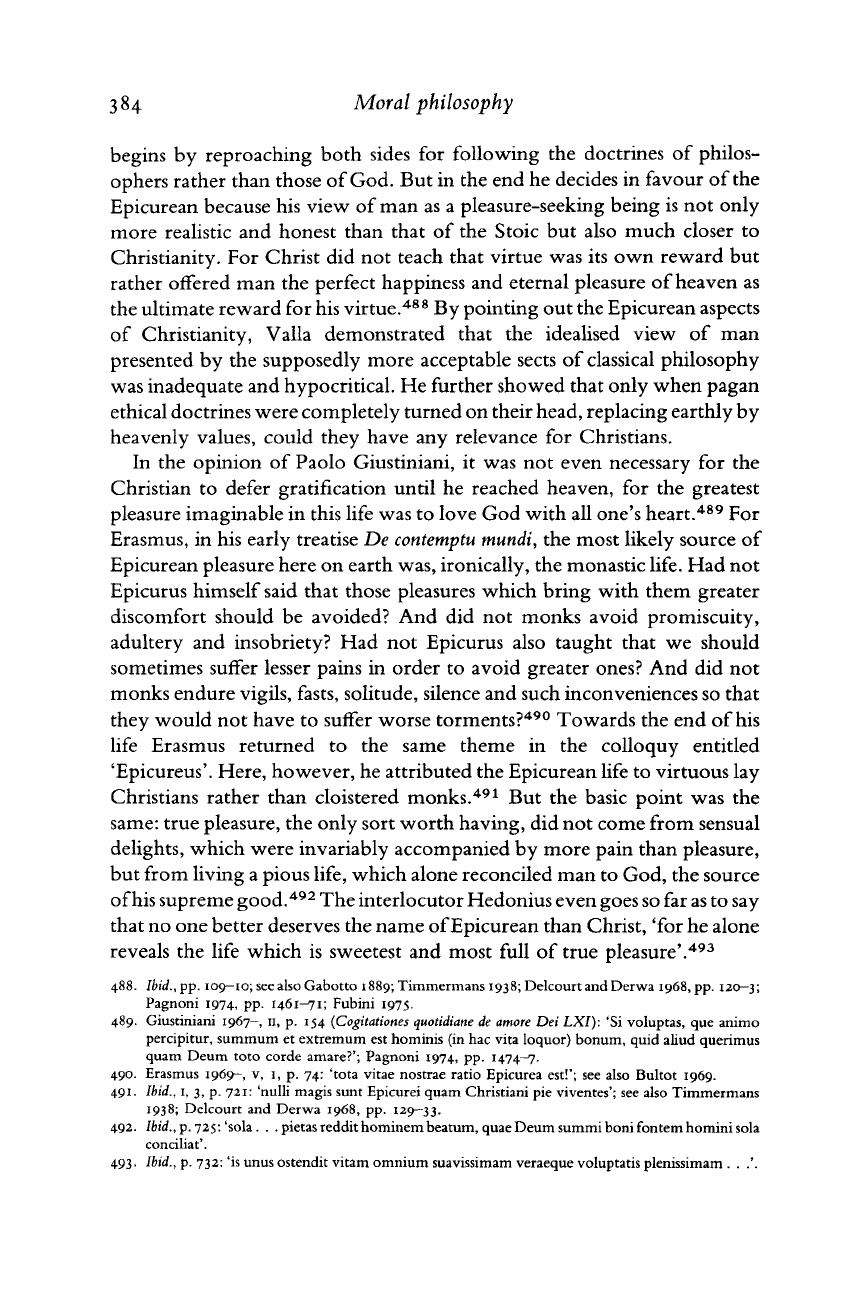
3«4
Moral
philosophy
begins by reproaching both
sides
for following the doctrines of philos-
ophers rather than
those
of
God.
But in the end he decides in favour of the
Epicurean
because his view of man as a pleasure-seeking being is not only
more realistic and honest than that of the Stoic but also much closer to
Christianity.
For Christ did not teach that virtue was its own reward but
rather offered man the perfect happiness and eternal pleasure of heaven as
the ultimate reward for his virtue.
488
By pointing out the Epicurean aspects
of Christianity,
Valla
demonstrated that the idealised view of man
presented by the supposedly more acceptable
sects
of classical philosophy
was inadequate and hypocritical. He further showed that only when pagan
ethical doctrines were completely turned on their head, replacing earthly by
heavenly values, could they have any relevance for Christians.
In the opinion of Paolo Giustiniani, it was not even necessary for the
Christian
to defer gratification until he reached heaven, for the greatest
pleasure imaginable in this life was to love God with all
one's
heart.
489
For
Erasmus,
in his early treatise De
contemptu
mundi, the most likely source of
Epicurean
pleasure here on earth was, ironically, the monastic life. Had not
Epicurus
himself said that
those
pleasures which bring with them greater
discomfort should be avoided? And did not monks avoid promiscuity,
adultery
and insobriety? Had not Epicurus also taught that we should
sometimes suffer
lesser
pains in order to avoid greater ones? And did not
monks endure vigils, fasts, solitude,
silence
and such inconveniences so that
they would not have to suffer worse torments?
490
Towards the end of his
life Erasmus returned to the same theme in the colloquy entitled
'Epicureus'.
Here, however, he attributed the Epicurean life to virtuous lay
Christians
rather than cloistered monks.
491
But the basic point was the
same: true pleasure, the only sort worth having, did not come from sensual
delights, which were invariably accompanied by more pain than pleasure,
but
from living a pious life, which alone reconciled man to God, the source
of his supreme good.
492
The interlocutor Hedonius even goes so far as to say
that
no one better deserves the name of
Epicurean
than
Christ,
'for he alone
reveals the life which is sweetest and most full of true pleasure'.
493
488.
Ibid.,
pp. 109—10; see also Gabotto 1889; Timmermans 1938; Delcourt and Derwa 1968, pp. 120—3;
Pagnoni
1974, pp.
1461-71;
Fubini 1975.
489. Giustiniani 1967-, 11, p. 154
(Cogitationes
quotidiane
de
amore
Dei LXI): 'Si voluptas, que animo
percipitur,
summum et extremum est hominis (in hac vita loquor) bonum, quid aliud querimus
quam
Deum toto corde amare?'; Pagnoni 1974, pp.
1474-7.
490. Erasmus 1969-,
v
, it p. 74" *tota vitae nostrae ratio Epicurea est!'; see also Bultot 1969.
491.
Ibid.,
1, 3, p. 721: 'nulli magis sunt Epicurei quam Christiani pie viventes'; see also Timmermans
1938;
Delcourt and Derwa 1968, pp. 129-33.
492.
Ibid.,
p. 725: 'sola. . . pietas reddit hominem beatum, quae Deum summi boni fontem homini sola
conciliât'.
493.
Ibid.,
p. 732: 'is unus ostendit vitam omnium suavissimam veraeque voluptatis plenissimam . . .'.
Cambridge Histories Online © Cambridge University Press, 2008
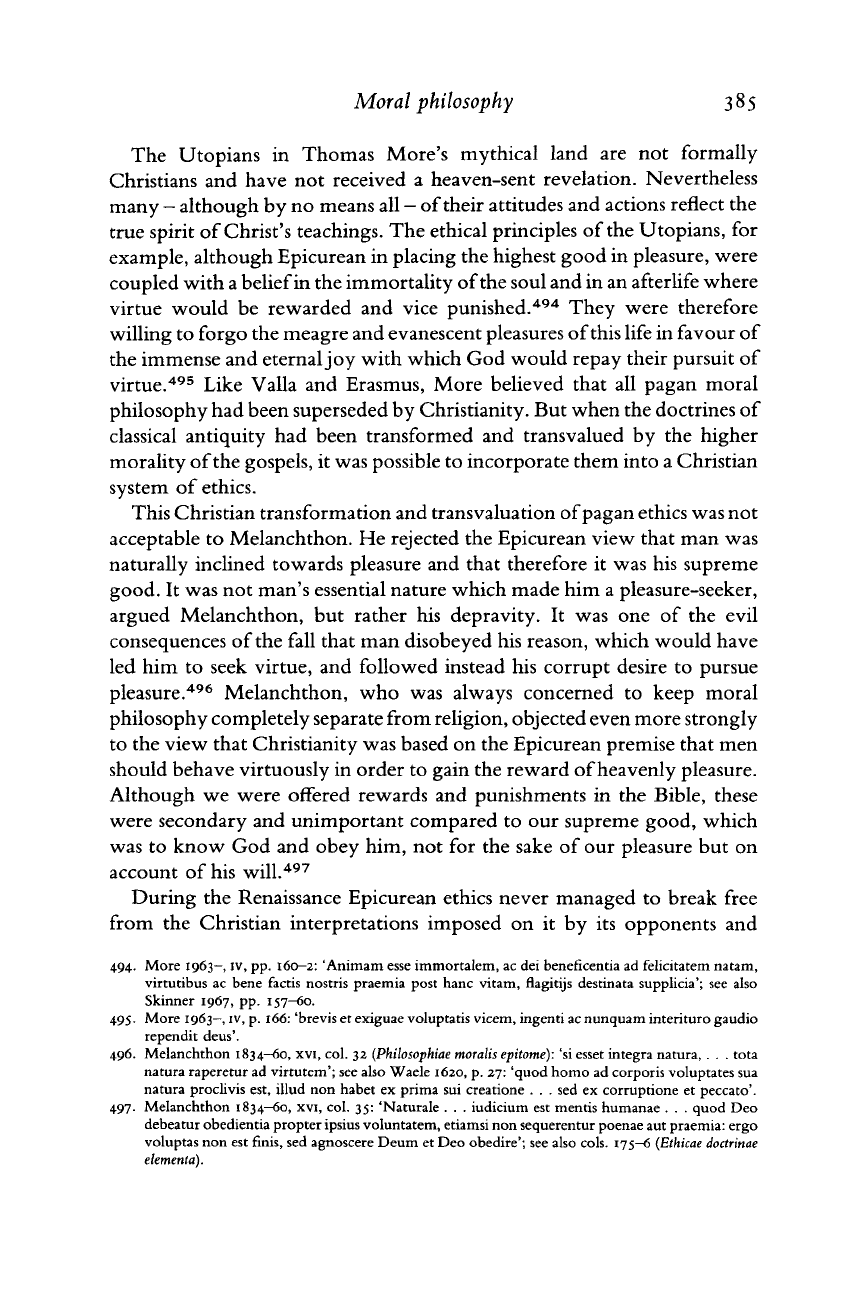
Moral
philosophy
385
The
Utopians in Thomas More's mythical land are not formally
Christians
and have not received a heaven-sent revelation. Nevertheless
many
—
although by no means all
—
of their attitudes and actions reflect the
true spirit of
Christ's
teachings. The ethical principles of the Utopians, for
example, although Epicurean in placing the highest good in pleasure, were
coupled with a belief in the immortality of the soul and in an afterlife where
virtue would be rewarded and vice punished.
494
They
were therefore
willing to forgo the meagre and evanescent pleasures of this life in favour of
the immense and eternal
joy
with which God would repay their pursuit of
virtue.
495
Like
Valla
and Erasmus, More believed that all pagan moral
philosophy had been superseded by Christianity. But when the doctrines of
classical antiquity had been transformed and transvalued by the higher
morality of the gospels, it was possible to incorporate them into a Christian
system of ethics.
This
Christian transformation and transvaluation of
pagan
ethics was not
acceptable to Melanchthon. He rejected the Epicurean view that man was
naturally
inclined towards pleasure and that therefore it was his supreme
good. It was not man's essential nature which made him a pleasure-seeker,
argued Melanchthon, but rather his depravity. It was one of the evil
consequences of the fall that man disobeyed his reason, which would have
led him to seek virtue, and followed instead his corrupt desire to pursue
pleasure.
496
Melanchthon, who was always concerned to keep moral
philosophy completely separate from religion, objected even more strongly
to the view that Christianity was based on the Epicurean premise that men
should behave virtuously in order to gain the reward of heavenly pleasure.
Although
we were offered rewards and punishments in the Bible,
these
were secondary and unimportant compared to our supreme good, which
was to know God and obey him, not for the sake of our pleasure but on
account of his will.
497
During
the Renaissance Epicurean ethics never managed to break free
from the Christian interpretations imposed on it by its opponents and
494. More
1963—,
iv, pp. 160—2: 'Animam
esse
immortalem, ac dei beneficentia ad felicitatem natam,
virtutibus
ac bene factis nostris praemia post hanc vitam, flagitijs destinata supplicia'; see also
Skinner 1967, pp.
157—60.
495. More
1963—,
iv, p. 166: 'brevis et exiguae voluptatis vicem, ingenti ac nunquam interituro gaudio
rependit deus'.
496. Melanchthon 1834—60, xvi, col. 32
(Philosophiae
moralis
epitome):
'si
esset
integra natura,. . . tota
natura
raperetur ad virtutem'; see also Waele 1620, p. 27: 'quod homo ad corporis voluptates sua
natura
proclivis est, illud non habet ex prima sui creatione . . . sed ex corruptione et peccato'.
497. Melanchthon 1834-60, xvi, col. 35: 'Naturale . . . iudicium est mentis humanae . . . quod Deo
debeatur obedientia propter ipsius voluntatem, etiamsi non sequerentur poenae aut praemia: ergo
voluptas non est finis, sed agnoscere Deum et Deo obedire'; see also cols. 175-6
(Ethicae
doctrinae
elementa).
Cambridge Histories Online © Cambridge University Press, 2008
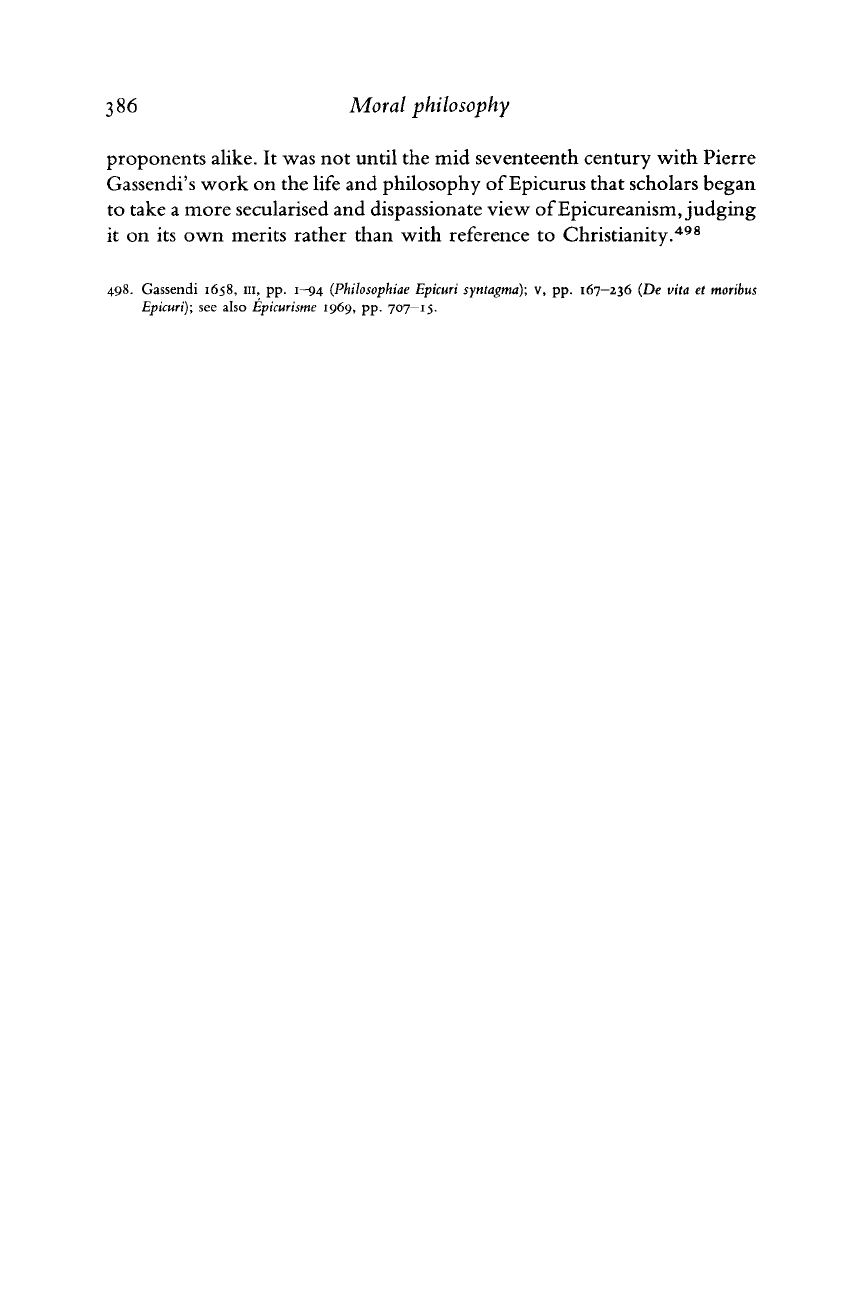
386
Moral
philosophy
proponents alike. It was not until the mid seventeenth century with Pierre
Gassendi's work on the life and philosophy of
Epicurus
that scholars began
to take a more secularised and dispassionate view of
Epicureanism,
judging
it on its own merits rather than with reference to Christianity.
498
498. Gassendi 1658, ni, pp. 1-94
(Philosophiae
Epicuri
syntagma)', v, pp. 167-236 (De
vita
et
moribus
Epicuri);
see also
Épicurisme
1969, pp.
707-15.
Cambridge Histories Online © Cambridge University Press, 2008
